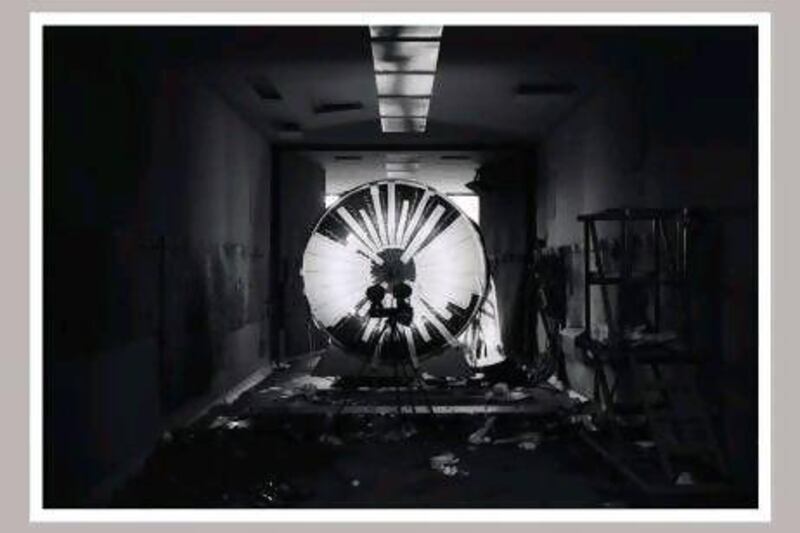A New York customs hall is a serious place at the best of times. So when the British artist Idris Khan took his latest work to the US, he wasn't entirely looking forward to the explanatory conversation with the officials. After all, the three large, black cylindrical sculptures making up the bulk of The Devil's Wall look, from a distance, somewhat akin to huge landmines. What's more, they're inscribed with text from the Quran in Arabic and English.
"We had a bit of explaining to do," smiles Khan, as he supervises the installation of the work in Manchester.
But there is nothing remotely controversial about The Devil's Wall. Instead, it's a beautifully reflective collection of sculptures and drawings that take inspiration from one of the final rituals of the Haj, in which seven stones must be thrown three times at the Jamarat.
The cylinders in his work allude to the dishes in which the stones pile up after they hit the walls, and as Khan walks over to one, he asks me to peer into the dark central hole into which inscribed words tumble. It's impossible to see the bottom, or indeed the end of the sentence.
"And that's the point," he says quietly. "I like my spaces to be contemplative and poetic, and I'm exploring the idea of something disappearing."
The emotional background of The Devil's Wall backs this up. One of the three sculptures is inscribed with extracts from the Surat Ya-Sin, the 36th chapter of the Quran, which, Khan discovered, his father had been reciting every night after his wife - Khan's mother - died. "It's supposed to keep you calm when you've lost someone," he says. But then, tragically, Khan lost his own baby too, and found that he was, suddenly, discussing grief and death a lot. "When you go to the Jamarat, you say: "God is great" as you throw the stones," he says. "But you're also supposed to be thinking about something in your life that you can leave behind. It's like a cleansing. And that certainly felt relevant at that time."
The linked drawings continued the process. Made by stamping and layering different words and sentences, reflecting how Khan was feeling, they took on the form of an explosion, mirroring the impact of the stones hitting the wall.
And yet The Devil's Wall is never mawkish, rather it's a fascinating exploration of Khan's own relationship with Islam and his own heritage. He was brought up in the faith and though he stopped seriously practising when he was 14, he acknowledges that much of his work is a poetic response to his upbringing. An earlier piece collated every page of the Quran in one sheet - which was potentially problematic but instead was praised by many throughout the Islamic world for its homage-like beauty. It was, essentially, a reflection of both a book that has influenced him throughout his life and the recurring theme of repetition in his work.
"You read the Quran a page a day, or a page a week, so you're always returning to the same thing, reciting, reciting, reciting. I find that really interesting," he says.
Khan's work is also in the current, highly praised Hajj: Journey to the Heart of Islam exhibition at the British Museum. A room is filled with 144 to-scale steel sculptures of the Kaaba; once again, it's a work with great reflective power.
"I'm fascinated by the spiritual feeling of sculpture," he says. "With my Haj work, it's been about exploring the idea of a strong, simple shape that draws people in and how it makes them feel. Yes, The Devil's Wall has Arabic text and it's inspired by the Jamarat, but in a way I hope it's not just a piece for Muslims, about Islam. It's softer than that. I want everyone to approach my work and, perhaps, have a moment of contemplation."
• The Devil's Wall is at Whitworth Art Gallery, Manchester until May 13. For more information, visit www.whitworth.manchester.ac.uk
Follow
Arts & Life on Twitter
to keep up with all the latest news and events
[ @LifeNationalUAE ]










